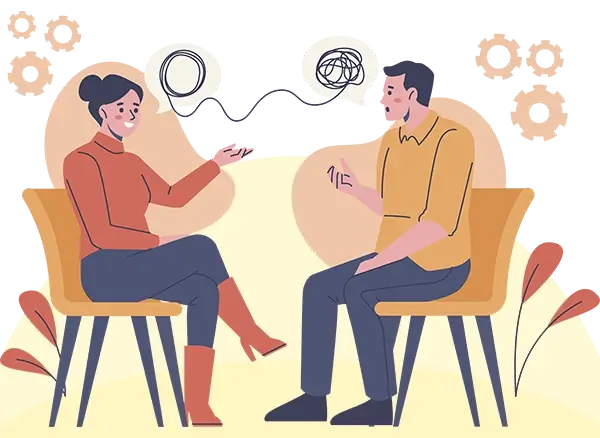Learn whether you may be living with BPD with this free online BPD test that is expert-reviewed. After receiving your results, you’ll have the opportunity to learn more about your symptoms and talk to a licensed therapist.
Begin TestThis mental health assessment is not a diagnosis or a substitute for licensed therapy. You can schedule with a qualified mental health professional here.
Are you wondering, “Do I have BPD?” If so, this test is for you. This test is not a substitute for an official diagnosis or mental health support from a qualified individual. Instead, this is a fast, online, free assessment that can gauge the likelihood of you having Borderline Personality Disorder. BPD is a complex disorder that cannot be summed up in these 10 questions; however, these questions are pulled from the DSM-5, the diagnostic criteria that therapists use when diagnosing Borderline Personality Disorder and other mental health conditions. Therefore, it’s a good tool to understand your behavior, emotions, and reactions.
Begin Test
BPD is characterized by rapid mood swings, difficulty in interpersonal relationships, trouble controlling their emotions, and a flawed sense of self. People with BPD commonly struggle with self-esteem and their self-image. This, paired with erratic mood shifts, can make it difficult for them to maintain healthy, stable relationships.
The exact cause of BPD isn’t clear, but it is thought to be caused by a mix of genetics and environmental factors. The vast majority of people with BPD suffered some form of childhood trauma, which is likely linked to the formation of the personality disorder.
Treating BPD is possible. It will take time and a commitment to a treatment plan, but people living with the personality disorder can find freedom from the most debilitating symptoms. Dialectical Behavioral Therapy is a primary method used and has been proven effective at treating BPD. Acceptance and Commitment therapy and schema therapy are also vital in improving someone with BPD’s sense of self and how they control their behavior and narrative.
If you think you have BPD but don’t score highly on this test, it’s worth it to talk to a mental health professional. One, 10-question test cannot fully summarize the entire extent of living with BPD. You may have experiences outside of these questions that were not measured. This test is meant to be a tool and starting point. If you did not score highly but still think you have BPD or a different mental health disorder, talking to a therapist is a good first step.
1.4 million people in the U.S. live with Borderline Personality Disorder, and countless therapists are there to support them through it. You are not alone. Talk therapy is a proven way to treat Borderline. The first step is to find a therapist who fits your needs. They will provide a customized treatment plan that suits your unique needs. Then you can choose between in-person or online therapy. With virtual therapy, you can receive BPD treatment from the comfort of your home. Our online therapists provide holistic support for overcoming Borderline Personality Disorder.
Find a Therapist

This free BPD test is not a substitute for a real assessment done by a mental health professional. In order to get tested and diagnosed with BPD, you can talk to either a Psychiatrist or a mental health therapist, like a Licensed professional counselor (LPC). They will walk you through an official assessment and be able to provide a diagnosis and treatment plan.
BPD and PTSD (Post Traumatic Stress Disorder) are two disorders that share some overlap. Trauma is a necessary factor in PTSD, and is a common cause of BPD as well. It is possible ot have both PTSD and BPD, but they are two separate disorders. You can take this free PTSD assessment to be screened for PTSD.
The only way to know for sure what disorder you have, or if you have both, is to talk to a mental health professional.
BPD and cPTSD (complex PtSD) share significant overlap in symptoms and causes and are often misdiagnosed as each other. However, there are significant differences. For example, BPD is characterized by an unstable sense of self, whereas cPTSD is characterized by a negative sense of self. On a similar note, while interpersonal struggles are found in both of these disorders, people with cPTSD may struggle interpersonally because of avoidance, whereas people with BPD struggle because of volatility and fear of abandonment. These are just some examples of the differences between BPD and cPTSD.
Bipolar and BPD share the same volatility in emotions. The big difference is that Bipolar will have extended mood swings that last days or even weeks, whereas BPD mood swings can occur within minutes.
If you think you might have Bipolar Disorder, you can take this free online Bipolar test to get a screening done. The only way to know for sure what disorder you have, or if you have both, is to talk to a mental health professional.
Depression and BPD are often comorbid, meaning they occur at the same time. But they are different, distinct disorders. Depression is a mood disorder characterized by a constant state of low mood, anhedonia, and low self-esteem. BPD is a personality disorder characterized by an unstable sense of self, changing emotions, and fear of abandonment.
If you think you might have Depression, you can take this free online Depression test to get a screening done. The only way to know for sure what disorder you have, or if you have both, is to talk to a mental health professional.
Comorbid disorders can be tricky to treat. Talk to a licensed therapist about what treatment plan would work best for you.